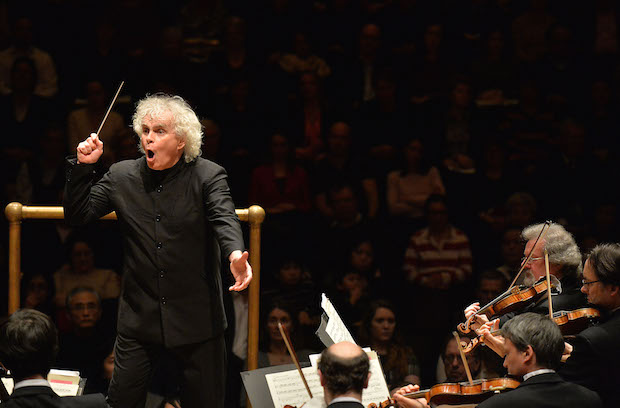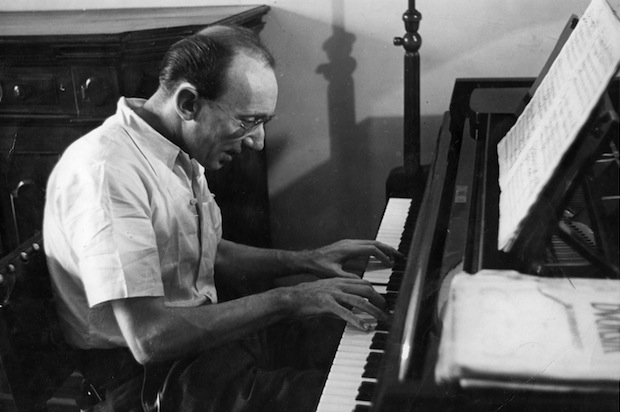Beethoven’s Hammerklavier Sonata is thrilling and brain-twisting. Its nickname derives from the fact that it was published as a sonata ‘for the hammer-action keyboard’, which just means a piano. But the notion of hammering suits this work. It’s his longest sonata — a late one, No. 29 in B flat, Op. 106 — and a mighty piece of machinery. I’ve been listening to it for 40 years and I’m not even close to grasping its details. It’s far more of a mental puzzle than the sublime last trio of sonatas, Opp. 109–111, whose construction is less tortuous.
The Hammerklavier has been in and out of my CD player a lot recently, for two reasons. I’ll explain later. If you don’t know the work, let me give you my version of the plot, as it were.
The sonata begins with an explosion: a fusillade of descending thirds that Beethoven originally wrote, years earlier, to be sung to the words ‘Vivat, vivat Rudolphus!’ — the opening fanfare to a never-completed brown-nosing cantata in honour of his patron Archduke Rudolf. In the words of the pianist and scholar Charles Rosen, the writing exhibits ‘a determination and fury previously unheard in music’. Also, Beethoven’s metronome mark requires a supernatural technique. No wonder that most performers decide that it ‘works better’ if you play it a bit slower, ‘allowing the detail to be heard’ — and, anyway, the old boy was deaf so probably misjudged the metronome.
Then there’s a snatched scherzo, also brutally fast, with a flurry in the middle that sounds like the piano accompaniment to a silent movie in which the heroine is tied to a railway track.
The slow movement is an Adagio sostenuto in F sharp minor, described by one 18th-century poet as ‘a gloomy key: it tugs at passion like a dog biting a dress. Resentment and discontent are its language.’ The main melody is one of the subtlest Beethoven ever wrote, treading as softly as a panther. Over the course of 20 minutes, it develops in baffling ways, alternating between major and minor, richly decorated but veiled and aloof, despite the marking con gran’espressione. It’s hard to hear the structure unless you follow the score — but perhaps we’re supposed to feel lost.
There follows a surreal interlude in which the pianist’s hands wander over the keyboard, as if groping for inspiration — an astonishingly avant-garde effect for 1818. Then Beethoven plunges into his finale, a fugue of dizzying chromatic patterns. Just getting the notes right is beyond the powers of many soloists, at least in live performance. A few years ago, I heard a famous Beethoven interpreter slam down the sustaining pedal and hope for the best. Yikes. And even that was less scrambled than Artur Schnabel’s 1935 recording, politely described as an ‘approximation’. On the other hand, Beethoven offers countless routes through the maze of the fugue, so every pianist who arrives safely — I’d single out Solomon, Brendel and Pollini — has created an individual masterpiece.
My first reason for listening to the Hammerklavier is a sad one. Perhaps I’m ‘over-sharing’, but this year one of my most precious friendships ended messily. My theory is that we tend to seek out music to match our moods, rather than change them. When we’re bereaved, or a relationship breaks up, many of us opt for masochistic sentimentality (‘our song’). But the gloom caused by an avoidable but irreversible falling-out is meaningless. Music of neurotic pain — say, the first movement of Mahler’s Ninth — doesn’t fit the bill. Neither does music of hope or triumph over suffering. I suppose I could get stuck into one of those bleak three-hour slow movements by Shostakovich, but life’s too short.
No: the match for my mood is the Adagio sostenuto of the Hammerklavier — the epitome of beauty without consolation. Or, to put it another way, life sucks and then you die, but here’s something amazing to listen to while you contemplate that.
And the other reason? There’s a new Hammerklavier in town, and my God it’s good. Igor Levit, a Russian-German pianist born in 1987, damn him, has recorded the last five Beethoven piano sonatas for Sony Classics. His playing is marked by purity, delicacy, polyphonic voicing — and so much technique in reserve that you suspect he could play that fugue with one hand. As for the slow movement, there may be some quirks of rubato but never has the thermostat been turned down so low. This is an intellectually stimulating reading that conveys nothing beyond hopelessness. Perfect.
Got something to add? Join the discussion and comment below.
Get 10 issues for just $10
Subscribe to The Spectator Australia today for the next 10 magazine issues, plus full online access, for just $10.
You might disagree with half of it, but you’ll enjoy reading all of it. Try your first month for free, then just $2 a week for the remainder of your first year.












Comments
Don't miss out
Join the conversation with other Spectator Australia readers. Subscribe to leave a comment.
SUBSCRIBEAlready a subscriber? Log in